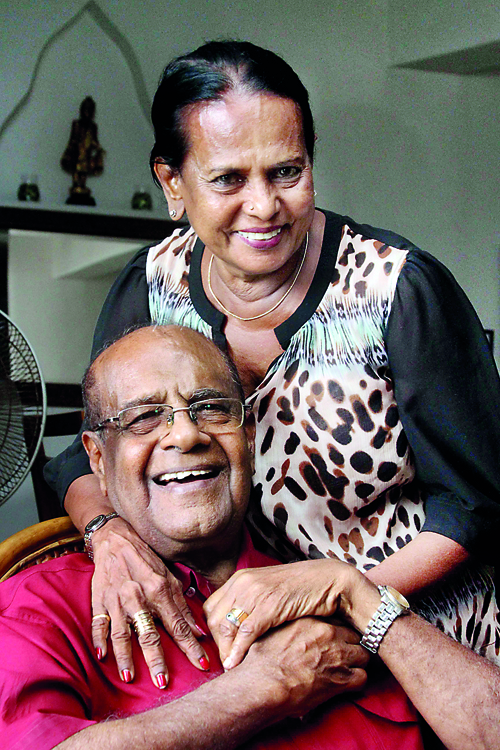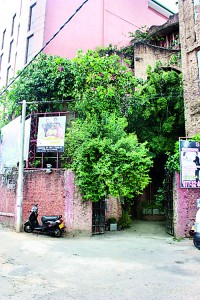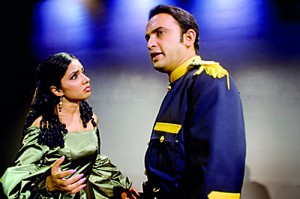Never a dull moment; on or off the stage
Namel Weeramuni lives atop his little theatre. Amid the clutter of small shops and heavy traffic in Borella, the building which houses the Punchi has always stood out, its unusual form highlighted by an uneven layer of thick orange clay that gives it texture and character. Four storeys up, a breeze blows steadily through Mr.Weeramuni’s living room. A balcony overlooks a rooftop garden complete with an araliya tree in bloom and myriad potted plants whose leaves quiver and bend in the wind. For this thespian, the thrum of the busy theatre below his feet has become the best kind of retirement.

A long and fulfilling partnership: Namel and Malini Weeramuni. Pic by Indika Handuwala
Today, Mr.Weeramuni is in the process of planning his 80th birthday party, but true to form, this party is in fact a play. It’s actually three days of performances featuring some of his favourite actors under his direction. Even as we speak, Malini, his wife of 52 years and co-founder of the Punchi is in the foyer downstairs, hands filled with tickets and other paraphernalia. She has said more than once that the Punchi is “his dream and my nightmare,” but she is an accomplished actress herself and her name is already on the playbill.
Having written for, directed and acted widely in both films and theatre, Mr.Weeramuni is known as a supporter and a role model for thespians of every stripe.The recipient of several awards (including three Sri Lanka State Awards), he shows no signs of slowing down as he comes up on his eighth decade of life.
It began, as it often does, with a love of books. His father, a wholesaler of cinnamon, was also a reader, but when he succumbed to pneumonia, a young Namel, then only six years old, was left bereft. The family continued to live in Ahungalla where Namel would soon begin going to school. That was only until an incident involving a poetry recitation, an insult and a schoolboy scuffle culminated in injury by ink bottle which saw him expelled.
Ironically, he remembers those months as idyllic – sitting under the coconut trees, a sea breeze ruffling his hair as he read his way through book after book (the first novel he ever read was W.A. Silva’s 1936 best seller, ‘Sunethra’). Finally, concerned that the boy was spending all his time loitering around the village, his uncles in Ratmalana brought him to live with them. Mr.Weeramuni would study first at St. Luke’s before coming to Colombo to enrol in Nalanda College (at the latter he would be voted President of both English and Sinhala Literary Unions and lead debating teams in both languages).
Before he could finish his schooling however, word came that his mother had succumbed to a long illness. The memory of this grief lingers in Mr.Weeramuni’s mind. “I was in Ratnapura at the time she died. I got really lost, you know.” An orphan now, he found escape in his studies.
So clever was he that he received double promotions four years in a row, and was the only direct entrant into University from Nalanda. An unusually versatile athlete, he set a national one mile cycling record in 1956 and would later wear university colours in boxing, rugger, athletics, hockey, football, and basketball. Enrolling in the cadet programme at Nalanda, he learned “to work hard and also to be honest and dedicated to what one did,” qualities he still counts as strengths. When a move was made to ban cadetting in schools, he began a successful campaign on behalf of the programme which culminated in himself and two other friends getting on to their bicycles to travel around the island for 13 days during which they covered 1400 odd miles as they rustled up support among ex-cadets.

Distinctive: The Punchi Theatre. Pic by Athula Devapriya
His breakneck pace would not slow over the next few years. When he completed his B.A in Sociology (Hons) in 1961 (which he would follow with a law degree in 1967), a professor commented that his student had packed all that could be imagined into that time and more – not least of which was convincing Malini to marry him. Perhaps not coincidentally, that time would also prove to be one of the most active phases in his career as a man of the arts.
In university, his great love of theatre flourished and took root. Whether it was all the losses sustained in his young life or his penchant for reading serious literature by the likes of Dostoevsky and Dickens, a fascination with tragedy and with the plight of the socially disadvantaged would become a recurring preoccupation throughout the decades that followed. “Those books imprinted in my mind the seriousness of life,” says Mr.Weeramuni now, speaking of how he had always wanted to inspire sympathy and awareness in his audience. “I always emphasise on that element of humanity.”
He remembers with particular pleasure playing the role of the son in Ediriweera Sarachchandra’s production of ‘Rattarang’ (Gold) in 1959. “Somalatha Subasinghe was my mother -in-law,” he says, adding with obvious pleasure that people still remember his turn on stage. “That marked my beginning and was one of my best performances.”
Outside of the theatre, he was a regular contributor to various local papers and in his last year was the editor of the university magazine. In 1961, he published ‘Ataramaga’ (At Cross Roads), which included the short story ‘Pathola Koratuwa’ that had earned him a Gold Medal at a university-wide competition (he has since published around eight books of poetry, prose and translations of plays and contributed to many others).
Beginning a long tradition of directing and acting in his own plays, he also staged ‘Muhudu Yanno’ (a translation of John Synge’s ‘Riders to the Sea’) and ‘Golu Birinda’ (an adaptation of Anatole France’s ‘The Man Who Married a Dumb Wife’) in 1960. Acting and directing simultaneously allowed him to fulfil his vision for the play. While an actor could bring an interesting interpretation to the table, Mr.Weeramuni’s focus as a director was always on communicating that one big idea. Acting in his own work offered him a kind of creative control that he sought.
In film he found another medium to love. A bevy of productions for both T.V and the big screen followed, beginning with Vasantha Obeyasekera’s ‘Wesgaththo’ (Disguised) in 1969, which proved popular enough to run for 5 – 6 months in theatres. The circle of performers who featured in these productions was small and Mr. Weeramuni was able to claim many of the finest actors of his generation as close acquaintances. In their company through one rehearsal after another, he remembers thinking how nice it would be if they had a theatre of their own. Even a cadjan house would do. “Building a theatre first came to my mind in 1963, but that was only realised in 2003,” he says.
How he did all this and still found time to nurture a career in the law is its own question. By this point he was one of only six assistant legal draftsmen at the Department of the Legal Draftsman under the Ministry of Justice, earning an enviable Rs.1,200 every month. Not knowing that he risked his job, Mr.Weeramuni took up an invitation from a friend to visit Canada on a scholarship. Having been delayed three weeks on his return, he called Mrs.Weeramuni from London only to hear he had lost his position. It was the worst possible news – having just built a home for themselves he was up to his neck in debt. Making it up as he went along, Mr.Weeramuni decided to try his luck in London.
Starting from scratch meant long hours and taking work wherever he could find it. He would shed his suit to serve as a gas station attendant or an assistant in a supermarket. To work again as an advocate would be a long, slow haul. It began with apprenticeship but after years of sometimes working 16 hours a day, he was finally a senior partner in his own outfit. Founded in 1982, Namel de Silva & Co had three offices and 41 people on its staff by the time he retired.
Having faithfully kept up with the world of theatre even in London, Mr. and Mrs.Weeramuni returned to Sri Lanka. To build the Punchi Theatre took much of their savings and cost them their ancestral property – a 16 room colonial mansion which was bulldozed but still lives on in the doors and window frames that adorn their current home. However, since it opened in 2002, the Punchi theatre has repaid their investment, hosting hundreds of productions and becoming, as its founders intended, one of the centres for the performance arts in Colombo.
For the Weeramunis the Punchi represents not just the culmination of a lifetime of passion and hard work but an ongoing celebration of it. “We are very, very happy,” Mr.Weeramuni says, adding what could only be a bonus: “Even our children don’t worry about us.”
| B’day treat of three plays
A trio of plays come to the Punchi Theatre this month in honour of its founder’s birthday. n August 29th – 31st: Nattukkari directed by NamelWeeramuni  A scene from Nattukkari A translation of Jean Anouilh’s Colombe, the play is based on the life of the legendary French actress Sarah Bernhardt. Daya Tennakoon, who has appeared in every one of the productions of the play (beginning from the first in 1970 at the Lumbini theatre) is among a stellar cast that includes Surangi Kolsala, Ruwan Wickramasinghe and Malini Weeramuni. n August 30th: ‘Deegeka Avith’ and ‘Kandoskiriyawa’: Two one act plays directed by NamelWeeramuni. ‘Deegeka Avith’, an adaptation of Anton Chekhov’s ‘The Proposal’ stars Anusha Dissanayake, Anil Wijesinghe and Prabhath Manoharan. Two shows at 3:30 p.m. and 6:30 p.m. every day. Tickets are on sale at the Punchi Theatre. |


